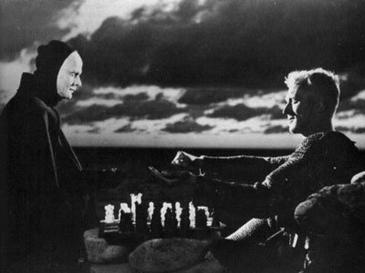Since I live in Sweden, I find it difficult to review
this movie. Ingmar Bergman's masterpiece "The Seventh Seal" has been
shown innumerable times on Swedish television, until it has become a pop
culture phenomenon (the movie is parodied as often in Sweden as in the US or
Britain). Also, the actors speak with a very old fashioned diction and
enunciation, making the movie involuntarily humorous to modern viewers -
provided you understand Swedish.
As a kid, I intensely disliked "The Seventh Seal". I was bored by it, and considered the plot incomprehensible. There are also scenes that resemble those of a horror movie. As a history-obsessed adult, I was more struck by the anachronisms. The main character, Antonius Block, is a knight returning from the crusades in Palestine. However, the plot is obviously set during the 1350's, at the time of the Black Death. By then, Palestine had been in Muslims hands for generations. The last crusader stronghold, Acre, fell already in 1291. And while crazy flagellants may have existed even in Sweden, they are usually associated with Spain. Some also claim that the chess game in the movie is played according to modern rather than medieval rules. But the most obvious anachronism is that neither Antonius nor his squire Jöns seems to believe in God - an impossibility in medieval Europe. Indeed, Block sounds like a modern existentialist!
But then, that's the point...
"The Seventh Seal" is really a philosophical movie about the human condition. The medieval setting is symbolic. Indeed, I suspect Ingmar Bergman quite deliberately chose a stereotyped, dark image of the Middle Ages as a backdrop to his story. There is also an obvious contrast between the medieval darkness, Block's existential anxiety and the lighter attitude of some of the other characters.
So what is the message, then? Despite the morbidly dark atmosphere (made worse by the fact that the movie is black and white), "The Seventh Seal" is actually quite optimistic. I took me years to really realize it, though.
Antonius Block gets in serious trouble already at the start of the story, when Death himself comes to take him away. During a classical stand off, Block challenges Death to a game of chess. If Block wins, he and his companions are free to go. If he looses, they will all die, but the game will at least have bought Block some time to solve the riddle of existence. During the respite, Block and Jöns journey through an absurd, apocalyptic landscape. Old scores are settled and some villains are roughed up. Block becomes friendly with two travelling actors, Jof and Mia, who seem to symbolize purity and innocence. (The names Jof and Mia are an obvious reference to the Biblical Joseph and Mary, "Josef" and "Maria" in Swedish.) Naturally, Death wants to kill both Jof, Mia and their little toddler (Baby Jesus?). At the last moment, the knight attempts to cheat in the chess game, thereby distracting Death, which enables the actors to get away to safety. Death eventually wins the game, but Block is satisfied nevertheless: he will die, but at least he saved Jof, Mia and their child. At the end of the movie, the entire landscape virtually lightens up, as Jof and Mia come out of the dark woods. Even the death of Block and his travel companions is suddenly seen from a more optimistic angle, as Jof retells a vision of how the knightly travelling party is dancing in the skies. Although led by Death to an uncertain fate, Block is somehow the winner. He failed during the "holy" crusades, and even lost his faith in God, but as a last act, he at least saved the innocent and pure.
What more can be asked for?

No comments:
Post a Comment